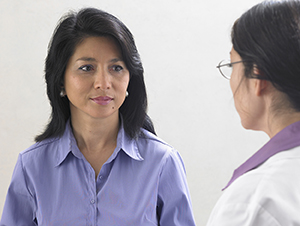Getting Your Breast Biopsy Results
Waiting for biopsy results is never easy. But in most cases, you will get your results within days. Your provider can tell you what to expect.
You may get the results during a follow-up visit with your healthcare provider. Or your provider may call you with the results. Either way, your provider will discuss what the test results mean for you. The lump may not be cancer. (This is called a benign lump.) Many benign lumps need no care at all. If a lump is cancer (malignant), you will have many things to think about.
Try to take comfort from the fact that more treatment options exist now than ever before. More tests may be needed to learn more about the cancer, such as how big it is and where it is. This helps your provider plan treatment. Your treatment team will work with you to come up with the plan that's best for you.

If a lump is benign
Learning that a lump is not cancer can be a great relief. To stay healthy, be sure to have mammograms as often as directed. Also, be aware of how your breasts normally look and feel so you can notice any changes right away. If you notice any changes, see your healthcare provider right away to have them checked.
Treating benign lumps
Lumps that come and go with your periods often don't need to be treated. Still, be sure to check with your healthcare provider. Sometimes limiting salt, caffeine, and alcohol can help relieve any soreness or swelling. If a fluid-filled cyst is tender, you may want to have it drained. Or a painful lump could be removed.
If a lump is cancer
Having breast cancer means that some cells in your breast are growing abnormally. These cells grow and divide faster than normal cells and can spread to other parts of your body. Today there are new and better treatments, as well as more ways to learn details about each person's cancer to help tailor treatment.
You can play an active role in your cancer care. Talk with your provider about what needs to happen next and the treatment options that are best for you.
Treating breast cancer
There is no one right treatment for breast cancer. The best approach for you will depend on the exact type and the stage of cancer you have. It will also depend on your age, overall health, and your feelings about treatment and side effects. Give yourself some time to weigh all of your options. Learning as much as you can about breast cancer can help you make the decisions that are best for you.